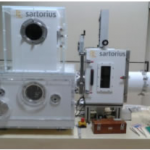
सीएसआईआर-राष्ट्रीय भौतिक प्रयोगशाला
CSIR-National Physical Laboratory

Mass Metrology
 Definition: Of the seven SI base units, the kilogram was the only base unit based on the prototype, known as the international prototype of kilogram (IPK). It is housed at the International Bureau of Weights and Measures (BIPM), Sèvres, France. The IPK is an alloy of 90% platinum and 10% iridium, with a cylindrical shape of 39 mm in diameter as well as height.
Definition: Of the seven SI base units, the kilogram was the only base unit based on the prototype, known as the international prototype of kilogram (IPK). It is housed at the International Bureau of Weights and Measures (BIPM), Sèvres, France. The IPK is an alloy of 90% platinum and 10% iridium, with a cylindrical shape of 39 mm in diameter as well as height.
In the year 2019, the kilogram in the world has been redefined in terms of Planck constant, which is being realized through Kibble-Balance.
In view of these advancements in mass metrology, CSIR-NPL is working towards new definition of kilogram and expansion of related infrastructure to maintain unbroken chain of traceability in the country.
Copies of the IPK were also given to the various National Metrology Institutes (NMI) that are members of the Meter Convention, known as the National Prototype of the Kilogram (NPK). India has copy number 57 (NPK-57) which is kept at CSIR-National Physical Laboratory. So far BIPM has recalibrated (NPK-57) in 1955, 1985, 1992, 2002, 2012 and 2022.
The mass value of NPK-57 is transferred to weights from 1 mg to 2,000 kg, NPL mass standards, solid density standards, and other derived parameters. Mass metrology has successfully passed through peer review and our current CMC’s on mass, volume, density and viscosity approved by BIPM is available in KCDB on the BIPM website. Mass Metrology sub-division has participated in several major comparisons and bilateral comparisons conducted by the CCM and APMP to reaffirm CMC.
Dr. Nidhi Singh
Senior Principal Scientist
Mass Metrology Section
Room No. 19, Apex Metrology Laboratory
CSIR – National Physical Laboratory
Dr. K. S. Krishnan Marg
New Delhi – 110 012, India
Email: singhnidhi@nplindia.res.in
Tel : 011-4709 1139, 4560 8215
All Rights Reserved - The Official Website of CSIR-National Physical Laboratory, New Delhi, Government of India
Site Designed & Managed by Knowledge Resource Centre
CSIR-NPL, New Delhi
India



